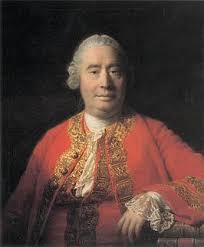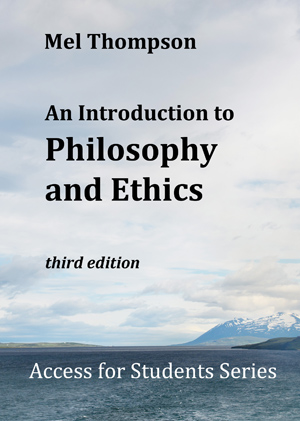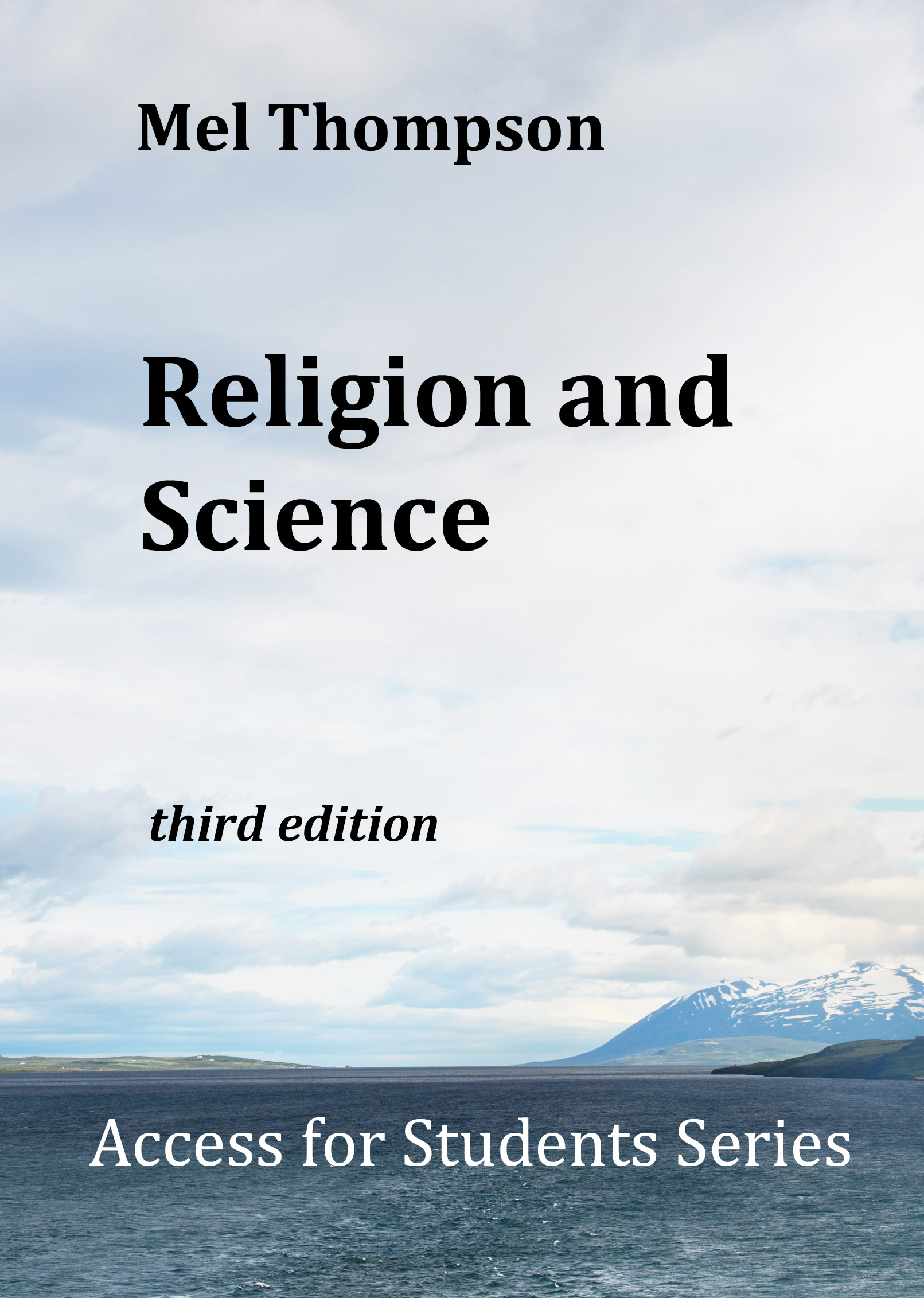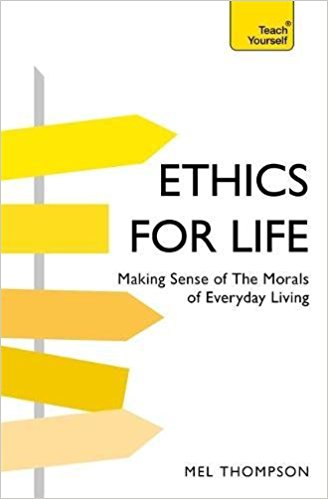NOTE - this page is about my book 'Ethical Theory'. For other material on Ethics click here and for notes for students click here.
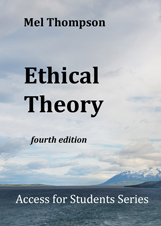 Ethical Theory
Ethical Theory
The 'Access for Students' series includes the following features:
-
'Key' questions, words, people, thoughts and quotes are given alongside the text, to add information and stimulate further thought.
-
In-depth coverage of issues to help students access higher grades.
-
Each chapter ends with a Study Guide, including a revision checklist of key points.
I have self-published the current edition of this textbook (originally published by Hodder Education) in a smaller format and lower price. It retains the same basic text and may be used alongside copies of the previous edition.
It provides an overview of the major ethical theories found in Western Philosophy, with quotations from original sources, and examples of how the theories may be applied to a range of contemporary moral issues.
It aims to give students and others a sound background in ethical theory, from which they can go on to deal with issues in applied ethics, along with advice on what makes a good and persuasive ethical argument.
Print copies are just £8.99 / $9.99; the Kindle version is £1.99 / $2.99. If you buy a copy, using the links below, I will receive a small referral fee. Many thanks!
Click here to buy in the USA / and in the UK
/ and in the UK
Sample material from the chapter on Utilitarianism...
Chapter checklist:
In this chapter we shall examine the principle forms of Utilitarianism, along with criticisms of this approach.
Utilitarianism has been one of the most widespread and influential ethical theories. In its simplest form it is based on the ‘Principle of Utility’ which is that, in any situation where there is a moral choice, one should do that which results in the greatest happiness for the greatest number of people (a phrase apparently coined by Frances Hutcheson). The theory of utilitarianism was set out by Bentham and developed by J S Mill and later by Sidgwick and it continues to command the attention of philosophers, notably Peter Singer.
Key terms:
Utilitarianism – an ethical theory by which actions are judged according to their anticipated benefits to the people involved
Consequentialism – used of any ethical theory that considers the consequences of an action. Hence, utilitarianism is one form of consequentialism.
1. Jeremy Bentham
Key thinker: Jeremy Bentham (1748-1832)
Bentham was much concerned with the social conditions of his day, with injustice, and with a failure of the law to defend the poorest in society. He was particularly involved both with hospitals and prisons. He sought a moral theory in which whatever was done in a society would be judged to be right or wrong according to whether or not it benefited a majority of those involved, not just a wealthy or privileged minority.
Bentham argued for the ‘Principle of Utility’, by which an action is judged good or bad according to the results that it achieved.
By utility is meant that property of any object, whereby it tends to produce benefit, advantage, pleasure, good, or happiness, (all this in the present case comes to the same thing) or (what comes again to the same thing) to prevent the happening of mischief, pain, evil, or unhappiness to the party whose interest is considered: if that party be the community in general, the happiness of the community: if a particular individual, then the happiness of that individual.
An Introduction to the Principles of Morals and Legislation, 1789, Ch 1, section 3
Key term:
Hedonic calculus – refers to the process (as exemplified by Bentham) of attempting to calculate the benefit or harm caused by an act.
Bentham worked on the assumption that society is a collection of individuals, and that what is right for society depends on securing the happiness of those individuals. In his assessment, he wanted everyone to count equally, since he believed that everyone had an equal right to happiness, irrespective of their situation. He suggested that happiness, or benefit, should be measured in terms of:
-
its duration
-
its intensity
-
how near, immediate and certain it is
-
how free from pain, and whether or not it is likely to lead on to further pleasure.
Each action, for Bentham, is thus good or bad according to its predicted results in generating the maximum amount of happiness, shared between the maximum number of people involved. His assessment was therefore essentially quantitative, and it was made on the basis of individual actions. Whether or not an action also conformed to a rule or law was a matter of secondary consideration – his primary interest was with the benefits generated and how they were shared. Bentham also took the view that acting according to this principle would itself bring about an individual’s greatest happiness. The Principle of Utility could therefore be followed for the pleasure of doing so, quite apart from the benefit it offered others.
2. John Stuart Mill
Key thinker: John Stuart Mill (1806 - 73)
Educated at home and precociously intellectual in his youth, Mill worked as an editor and in business before becoming involved with politics as MP for Westminster. He argued for women’s rights, for utilitarian ethics and particularly for individual freedom. His best known works are Utilitarianism and On Liberty.
There are many forms of benefit or happiness, and Mill argued that they should not all be considered to be of equal value. He therefore wanted to go beyond the quantitative assessment of benefits offered by Bentham, and to offer an assessment of benefits that would place greater emphasis on what he considered the ‘higher pleasures’. He was, however, quite realistic about human nature in this respect:
It may be objected that many who are capable of the higher pleasures occasionally, under the influence of temptation, postpone them to the lower… Men often, from infirmity of character, make their election for the nearer good, though they know it to be the less valuable; and this no less when the choice is between two bodily pleasures than when it is between bodily and mental. They pursue sensual indulgences to the injury of health, though perfectly aware that health is the greater good... Capacity for the nobler feelings is in most natures a very tender plant, easily killed, not only by hostile influences, but by mere want of sustenance; and in the majority of young persons it speedily dies away in the occupations to which their position in life has devoted them, and the society into which it has thrown them, are not favourable to keeping that higher capacity in exercise.
(Utilitarianism, 1863, chapter 2)
Key quote:
Men lose their high aspirations as they lose their intellectual tastes, because they have not time or opportunity for indulging them; and they addict themselves to inferior pleasures, not because they deliberately prefer them, but because they are either the only ones to which they have access or the only ones which they are any longer capable of enjoying. It may be questioned whether anyone who has remained equally susceptible to both classes of pleasures every knowingly and calmly preferred the lower, though many, in all ages, have broken down in an ineffectual attempt to combine both.’
Mill, UtilitarianismKey thought: self-sacrifice
A possible objection to utilitarian arguments is that, in calculating the happiness to be achieved, they do not appreciate the value of self-sacrifice, which features highly in traditional Christian morality. Mill has two things to say to counter this. The first is to link his theory with Jesus’ teachings, by claiming that to love your neighbour as yourself constitutes ‘the ideal perfection of utilitarian morality’. The second is to give a positive role for self-sacrifice:
The utilitarian morality does recognise in human beings the power of sacrificing their own greatest good for the good of others. It only refuses to admit that the sacrifice is itself a good. A sacrifice which does not increase or tend to increase the sum total of happiness, it considers as wasted.
Utilitarianism, 1863, chapter 2
Mill also went beyond Bentham in proposing a positive place for rules within an overall utilitarian approach. The example he uses is of a person who tells a lie in order to get some immediate advantage. He argues that society needs the principle of truthfulness, without which nobody would ever be able to trust anybody to be telling the truth. Therefore, the rule that one should tell the truth is a general means of securing the greatest happiness for the greatest number. Breaking that rule, although it might appear to offer greater happiness in the immediate situation, will in the long run lead to less happiness. Hence he accepts what we term ‘rule utilitarianism’.
Key terms:
Act utilitarianism – utilitarian theory applied to individual actions
Rule utilitarianism – utilitarian theory that takes into account the benefits gained by obeying general rules of conduct
Mill gives two examples of situations where he considers that it would be right not to tell the truth:
-
One should not give information to someone who is like to use it to further an evil purpose
-
One should withhold bad news from someone who is dangerously ill, for fear of causing him or her harm.
These show that Mill is still prepared to consider the direct results of individual actions as well as the rules that are thought to offer general good to society. It is also worth noting that, for Mill, the ultimate justification for moral choice, and for utilitarian and all other forms of morality, is ‘the conscientious feelings of mankind’. Thus, although we appear to have in utilitarianism an almost mechanical way of gaining an objective assessment of what is right or wrong (by setting out the predicted results of an action), in the end, even the application of that principle is based on a fundamental moral sense that people have.
Key thought:
The distinction is sometimes made between strong rule utilitarianism and weak rule utilitarianism, the former holding that one should never break a rule that is established on utilitarian principles, the latter holds that there may be situations when the likely outcome of a particular act may take precedence over the general rule in a utilitarian assessment, although of course that rule still needs to be taken into account.
Some modern approaches to act utilitarianism tend to say that an act should be considered good if, on balance, it produces enough happiness, rather that requiring it to produced the maximum possible happiness. This is part of a general attempt to make utilitarian theories workable in practice, without making demands for certainty (either in terms of assessing all the possible future consequences of an action, or checking the consequences of each alternative course of action) that are impossible to satisfy.
Mill himself – in On Liberty – set a clear limit to what an individual should be free to do, namely that his or her action should not harm others. Provided it concerns only that individual, there should be complete freedom. Notice that this sets limits to those things about which a utilitarian ethic can comment. Natural Law claimed that it was able to comment on the rightness or wrongness of actions that concerned only the individual (solitary masturbation, for example), whereas Mill’s position would suggest that such things are a matter of personal preference and freedom.


